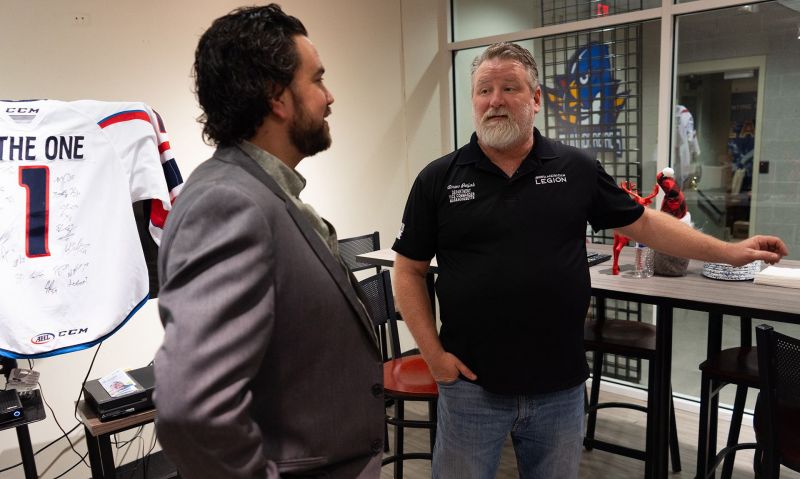
Timely intervention saved Legionnaire who was on the cusp of suicide. Now, he is embracing life, family, friends and the quest to save others from self-harm.
Editor’s note: This story addresses topics related to suicide and may be upsetting to some. If you are in crisis or having suicidal ideation, immediately call 988 and press 1 (if a veteran) to talk anonymously with someone who can help.
For Drew Pajak, The American Legion’s Be the One mission is personal.
After his service in the Navy, Pajak worked in law enforcement for 20 years, retiring in 2008. That took its toll.
“I have seen the absolute worst in people,” he says of his time on the force. “I have seen things happen to people, from little kids to adults, that I wouldn’t wish upon anybody. Fatal accidents, shootings, things like that.”
Pajak was entrenched in a dark place. He had quit taking his medications. “I didn’t want to be around anybody,” he said. “I just hated people. I totally withdrew. I stopped going to Legion functions. I didn’t want to be involved in anything.”
One night, he had had enough. He was ready to put his truck “into a river or into a wall. I did not give a damn anymore.”
Pajak was in crisis. As he was driving, a former Department of Massachusetts commander happened to call, which allowed Pajak to unload “everything that was bugging me.”
The timely intervention gave him a moment to process, begin to emerge from crisis and an opportunity to call 988. After speaking with a counselor as he drove, Drew returned home and opened up to his wife, Jodie. “The things that I have seen over the years, I wouldn’t wish upon anybody, including suicides, homicides,” he said.
To this day, the former department commander does not know the role he played in keeping Pajak alive. That underscores the importance of The American Legion’s Buddy Check program, whether it’s a coordinated effort to reach out to a group of veterans for wellness checks, or just calling a buddy to make sure he or she is doing OK.
Now Pajak is a living, breathing example of what happens when someone takes the appropriate action when a veteran’s life is at risk. That’s the heart of Be the One, which aims to reduce the rate of veteran suicide by destigmatizing mental-health treatment and empowering everyone to make a difference.
“I was at a point where I didn’t want to play anymore,” he said. “This is very personal for me because I had people there to ‘be the one’ for me.”
Pajak reflects back to Pete, a Navy friend who was lost to suicide. Pete visited the Pajaks in their home in January 2011. “Everything seemed fine. Everything seemed beautiful.”
But all was not well. Months later, his friend got into a fight with his wife, stormed outside and died by suicide.
“If I would have known more then, could I have ‘been the one’ for Pete?” Pajak said. “Without even knowing it, someone else was the ‘be the one’ for me. Is (Be the One) personal? Between Pete and the low places I hit a couple of years ago, yes. You gotta have someone to talk to.”
It’s personal for Jodie, too, the National Executive Committeeman for the Department of Massachusetts.
“Veterans suicide is a cancer that should not be,” she said. “There are way too many resources, way too many programs to help veterans and their families, to help combat these needs and feelings that these veterans develop in their military careers and come across as they try to transition out of service and back to civilian life. You can’t just flip a switch and go from structured to unstructured. You have to have some help. After a few years, you find you just can’t cope. With this program we hope that they see us and seek us out.”
The Pajaks are leading awareness efforts in their community of Springfield, Mass., where Drew’s family has had season tickets to the minor league hockey team’s games since 1936. Department of Massachusetts American Legion members and the Thunderbirds team are engaged in a season-long promotion of Be the One.
That community awareness helps elevate mental-health awareness and underscores that it is OK to not be OK.
“It was just a bad day,” Pajak says of the night he was driving around. “If you are having a bad day, reach out to somebody. I know it’s not easy but find somebody to talk to.”
Just like the former department commander does not know his “Be the One” role related to Pajak, it’s possible — even probable — that Pajak could also be an anonymous “Be the One” savior to a veteran in crisis.
“That would be the best part of it,” he said. “If I can save one veteran by sharing my story, it’s worth it.”
- Be the One

